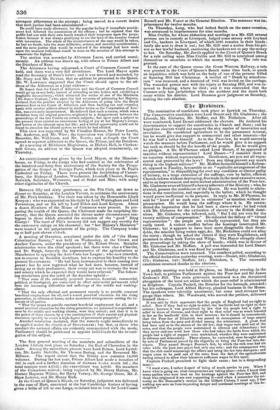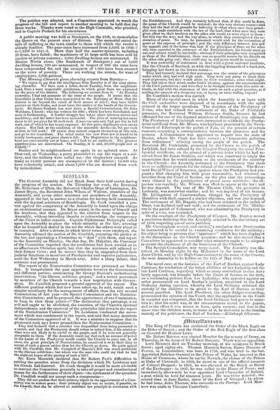Sb e Vrobintes.
The nomination of candidates took place at Ipswich on Thursday. The Conservative candidates were Lord Desart and Mr. Gladstone ; the Liberals, Mr. Gisborne, Mr. Moffatt, and Mr. Nicholson. After all were nominated, Lord Desart addressed the electors. He declared his determination to support the constitution in Church and State ; and he hoped the electors would not support the airy castles of innovation and revolution. He considered agriculture to be the paramount interest, but be would give due support to commercial and other interests—for he was half a sailor himself. As to the Poor-law, he would narrowly watch the measure before Parliament, and he would give it no support but such as should be for the benefit of the people. But he would give no pledges. A Mr. M'Pherson asked Lord Desert, if be approved of taxation without representation ? Lord Desart—" I consider there is no taxation without representation. Gentlemen, are you not all repre- sented and protected by the laws ? Does any thing prevent any man's rising to the highest stations? " Mr. Moffatt declared himself a Reform- er, opposed to Finality, favourable, to an " equitable arrangement of the representation," to disqualifying for ever any candidate or elector guilty of bribery, to a large extension of the suffrage, vote by ballot, efficient Church-reform without destroying, free trade in the most extensive sense, and to an improvement and more lenient administration of the Poor-law. Mr. Gladstone avowed himself a hearty adherent of the Ministry ; who, he averred, possess the confidence of the Queen. He was hostile to altera- tions in the constitution, and especially to the ballot; which he thought would prove ineffectual to its purpose. In reply to Mr. M`Pherson, be said he " knew of no such case in existence " as taxation without re- presentation. He would keep the suffrage where it is. He contra- dicted the imputation that he had been a slave-owner : he had voted with Mr. Gisborne for the extinction of slavery in the British domi- nions. Mr. Gisborne, who followed, said, " But I did not vote for the twenty millions of compensation." He ridiculed the fallacy of" virtual representation ": the people are virtually represented, but they are really taxed. A violent conflict before the hustings interrupted Mr. Gisborne ; but it appears to have been more disagreable than formi- dable, the missiles being rotten eggs, &c. Mr. Nicholson could not allay the storm ; though he asked the rioters if they were Englishmen, and promised to abuse both Tories and Whigs. The Mayor abruptly closed the proceedings by taking the show of hands ; which was in favour of Mr. Gisborne and Mr. Moffatt. A poll was demanded for Lord Desart and Mr. Gladstone, and it was fixed for yesterday.
The Conservatives were returned. The numbers polled, according to the official declaration yesterday evening, were—Desart, 680; Gladstone, 673 ; Gisborne, 543 ; Moffatt, 541; Nicholson, 3. The successful candidates returned thanks to the electors.
A public meeting was held at Brighton, on Monday evening, in the Town-hall, to petition Parliament against the Poor-law and Sir James Graham's Bill. The main grievance mentioned was the threatened abrogation of the local act under which the poor-relief is administered in Brighton. Captain Pechell, the Member for the borough, attended ; but his colleague, Lord Alfred Hervey, pleaded business in the House. The speakers were tolerably unanimous, but some used stronger lan- guage than others. Mr. 'Woodward, who moved the petition, delivered himself thus— It was said by their opponents that the people of England bad no right to relief. Now if they had no right to relief, the landlords had no right to their estates ; because it was guaranteed by law that the people had a right to relief in times of distress, and their right to that relief was as much founded in law as the landlords' title to their incomes ; for it should be remembered, that the Poor-law of Elizabeth was passed in consequence of large estates being taken from the poor and divided among the aristocracy. A great deal had been said as to the abuses of the old law, that wages were paid out of the rates, and that the people were maintained in idleness and debauchery: but they never said one word how those who had taken the lands from which the people had a right of support were maintained, whether they were maintained an idleness and debauchery. Those abuses, he contended, were brought about by acts of Parliament passed by the oligarchy to bring the Poor-law into dis- repute. They passed Sturges Bourne's Act, by which the rich man had six votes while the poor rate. payer had only one vote : and the consequence was, that the rich could mismanage the affairs and bring the law into disrepute; and wages came to be paid out of the rates from the fact of the agriculturists having refused to allow their labourers sufficient wages to live upon. Captain Pechell promised to fight their cause; but in a desponding tone- " I must state, 1 rather despair of being of much service to you. When I know what is going on, what compromises are taking place—when I know that many parties who were loud on the hustings against the Poor-law Bill, and those who originated it are now supporting it —and when 1 remember the 1711•• nority on Mr. Duncombe's motion on the Gilbert Unions, I must say, 1 fear nothing can save us from impending danger and continual meetings of this de- scription."
The petition was adopted, and a Committee appointed to watch the progress of the bill and report to another meeting to be held that day three weeks. Thanks were voted to the High Constable, who presided, and to Captain Pechell for his attendance.
A public meeting was held at Stockport, on the 25th, to memorialize the Queen on the present state of distress. The memorial stated de- tails of suffering in the town similar to those with which the reader is already familiar. The poor-rates have increased from 2,6281. in 1836-7 to 7,120/. in 1841-2. More than half the master-spinners, including 29 firms, have failed ; the machinery of 21 large mills has been sold by auction or private contract ; 3,000 dwelling-houses are untenanted. In Heaton Norris alone, (the Southwark of Stockport,) out of 3,000 dwelling-houses, 700 are untenanted, in respect of 800 the rates have been compounded for, and the occupants of 1,000 have been excused on the score of poverty. There are walking the streets, for want of employment, 5,000 persons. The Morning Chronicle gives alarming reports from Burnley- " We regret to say that the intelligence from Burnley is of the most alarm- ing character. We have seen a letter, dated Tuesday, from the neighbour- hood, from a most respectable gentleman, in which great fears are expressed for the peace of the district. The following we extract from it. At Burnley yesterday, I bad sad accounts of the state of the people. It seems that the Guardians in that Union have represented to the Secretary of State that the distress is far beyond the reach of their means of relief; they have 12,000 persons on their books, and must leave the matter in the hands of the Govern- ment. Sir James Graham has sent down a Special Commissioner, Sir John Walsham, I heard ; who has written for 500/. ; which has been distributed, and more is forthcoming. A fearful struggle has taken place between sinews and machinery, and the latter has been successful. The price of weaving has come down to 5d. per piece for 66-inch reed. A man can earn only 7frd. per day in full work, out of which he has to pay expenses. At this price, machinery even has no chance. But look at the condition of the miserable devils-3s. 9d. per week at best, in full work ! Of course they cannot support themselves at this rate, and go to the Guardians. The relief under the new Poor-law is found to be totally inadequate, and great alarm is felt. The Magistrates in the neighbour- hood are conveniently not at home, and I look to an outbreak. The greatest apprehensions are entertained. On Sunday, it is said, 20,000 people met at Enfield.'"
Dudley and its neighbourhood are again in an agitated state. At Shut-end, on Wednesday, a party proceeded to cut the ropes at a col- liery, and the military were called out : the ringleaders escaped. As many as 15,000 persons are unemployed in the district ; 14,000 who have voluntarily struck, and about 1,000 who are deterred from work by intimidation.



























 Previous page
Previous page